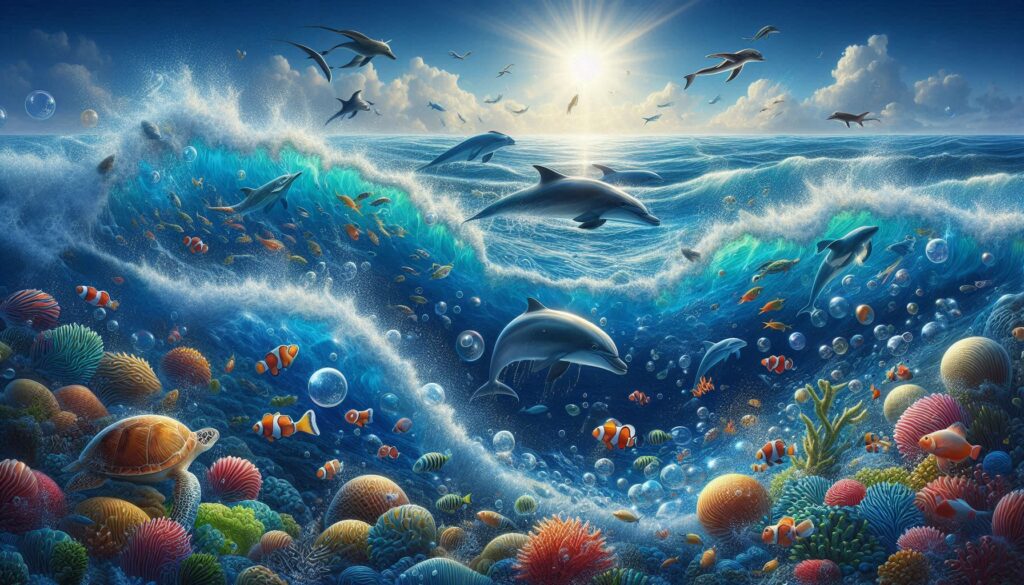Every year on June 8th, the world comes together to celebrate World Oceans Day. This global event is more than just a day to appreciate the vast, mysterious waters that cover over 70% of our planet. It’s a crucial reminder of the significant role oceans play in our lives and the urgent need to protect them for future generations.
The Vital Importance of Our Oceans
Oceans are the lifeblood of Earth, influencing weather patterns, regulating climate, and providing oxygen and food. They are home to an incredible diversity of life, from the smallest plankton to the largest whales. Here are a few key reasons why oceans are indispensable:
1. Climate Regulation: Oceans absorb about 30% of the carbon dioxide produced by humans, helping to mitigate the impacts of climate change. They also store vast amounts of heat, which helps stabilize the global climate system.
2. Biodiversity: Marine ecosystems support a wide range of species, many of which are still undiscovered. Coral reefs, for example, are known as the “rainforests of the sea” due to their incredible biodiversity.
3. Economic Resources: Oceans provide numerous economic benefits, including fisheries, tourism, and even pharmaceutical ingredients. Millions of people around the world depend on oceans for their livelihoods.
4. Oxygen Production: Phytoplankton, microscopic organisms in the ocean, produce about 50% of the world’s oxygen through photosynthesis, making them essential for life on Earth.
Current Threats to Our Oceans
Despite their importance, oceans are facing unprecedented threats caused by human activities. Here are some of the most pressing issues:
1. Plastic Pollution: Every year, millions of tons of plastic waste end up in the oceans. This pollution harms marine life, poisons food chains, and creates massive floating garbage patches.
2. Overfishing: Overfishing depletes fish stocks, disrupts marine food webs, and threatens the livelihoods of communities that depend on fishing. Many species are now at risk of extinction due to unsustainable fishing practices.
3. Climate Change: Rising temperatures and increased carbon dioxide levels are causing ocean acidification, coral bleaching, and shifting marine ecosystems. These changes threaten biodiversity and the health of marine habitats.
4. Habitat Destruction: Coastal development, pollution, and destructive fishing methods, like bottom trawling, are destroying critical habitats such as coral reefs, mangroves, and seagrass beds.

Why We Must Act Now
The health of our oceans is directly linked to the health of our planet and our well-being. Without immediate action, the damage to marine ecosystems could become irreversible. Here are some reasons why protecting our oceans is critical:
1. Sustainable Food Sources: Oceans are a primary source of protein for over a billion people. Sustainable management of marine resources is essential to ensure food security for future generations.
2. Economic Stability: Healthy oceans support industries such as fishing, tourism, and biotechnology. Protecting marine environments can safeguard millions of jobs and promote economic growth.
3. Climate Resilience: By preserving marine ecosystems, we enhance their ability to act as carbon sinks and buffers against climate change impacts. This resilience is crucial for adapting to and mitigating climate change.
4. Biodiversity Conservation: Protecting oceans helps preserve the intricate web of life they support. Biodiversity is essential for ecosystem stability, resilience, and the overall health of our planet.
How You Can Make a Difference
While the challenges facing our oceans are daunting, there are many ways individuals can contribute to their protection. Here are some actionable steps you can take:
1. Reduce Plastic Use: Minimize your plastic consumption by using reusable bags, bottles, and containers. Participate in local beach clean-ups and support policies aimed at reducing plastic pollution.
2. Support Sustainable Seafood: Choose seafood that is sustainably sourced. Look for certifications like the Marine Stewardship Council (MSC) label, and educate yourself about which species are overfished.
3. Reduce Carbon Footprint: Lower your carbon footprint by conserving energy, using public transportation, and supporting renewable energy sources. Reducing carbon emissions helps mitigate ocean acidification and climate change.
4. Advocate for Change: Raise awareness about ocean issues in your community and support organizations dedicated to marine conservation. Advocate for stronger environmental regulations and policies that protect marine ecosystems.
5. Educate Yourself and Others: Learn about the ocean and its ecosystems. Share your knowledge with friends, family, and your community to inspire collective action.
World Oceans Day is a poignant reminder of the beauty, wonder, and essential value of our oceans. It is also a call to action for every one of us to take responsibility for their protection. By making conscious choices and advocating for sustainable practices, we can ensure that our oceans remain vibrant and healthy for generations to come. Let’s honor this day by committing to protect our blue planet and its invaluable resources.
Read more: World Environment Day: A Call to Action for a Sustainable Future


